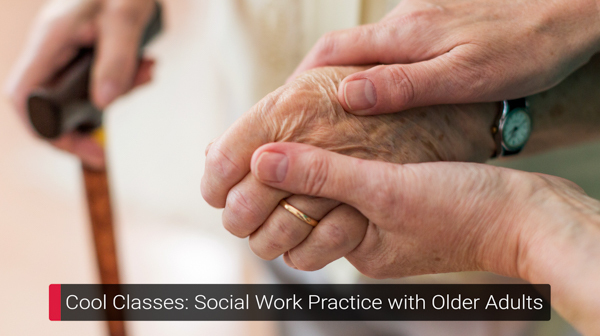- Future Students
- Current Students
- Faculty
- Staff
- Alumni
- Others
Cool Classes: Social Work and the Law
Why is the course interesting?
“Social Work and the Law” provides not only a thorough overview of the ways in which a variety of vulnerable populations could interact with laws and the justice system, but it also offers a comprehensive look at Canada’s legal system that would be accessible even for people with no prior experience studying the law.
The fourth-year Community Social Services course is meant as an introduction to law with a specific focus on topics or issues that could be of interest to those preparing for a career in social work or community advocacy.
No two weeks of the course are the same. One lesson could focus on laws and issues relating to mental health, while the next could explore laws affecting the treatment and rights of senior citizens. To help illustrate the importance of these legislative lessons, instructor David Mikelberg – a youth criminal justice lawyer with years of experience – brings recent real-world examples into the classroom that consistently engage his students.
“We try to bring a practicality to the course,” he explains. “Students in this program bring an interesting perspective because they’re really practical about what they do, but what we’re looking at is more legislative.
“So we always discuss recent cases that are the most interesting and relevant to them. For instance, we could talk about the new law on assisted dying, the Supreme Court decision and what’s going on with it. When you talk about things that way, the material really is of interest to the students.”
What will you learn?
The course begins with a general overview of Canada’s legal framework, before exploring the Canadian Charter of Rights and Freedoms and the overall structure of Canada’s judicial system.
Each week of the course explores a different topic. The course does cover specific legislation – including the Mental Health Act, Youth Criminal Justice Act and Income Assistance Legislation – while also delving into topics potentially important to those interested in the social work field, including issues of consent and determining capacity to consent.
“Social Work and the Law” also delves into sexual assault cases, with one unit focused on the ways in which the system tends to fail victims.
What will you take away from the course?
Mikelberg makes it very clear to his students that the goal of this course is not in any way to put someone in a position to give legal advice.
Instead, the goal is to empower students with a better understanding of the law and what rights people have, and to know how to direct someone in need to the right places, people and resources.
“Social workers are not lawyers and should never give legal advice, but because they’re dealing with issues around the law, they should have a knowledge base,” said Mikelberg, who also teaches in the University of Guelph-Humber’s Justice Studies program.
“For example, they’re not going to advise a kid on what criminal offence they might be facing, but they should know that there’s a Youth Criminal Justice Act, that there are youth criminal lawyers who specialize in this, and what some of the possible programs available are. That’s not legal advice – it’s legal information.”








